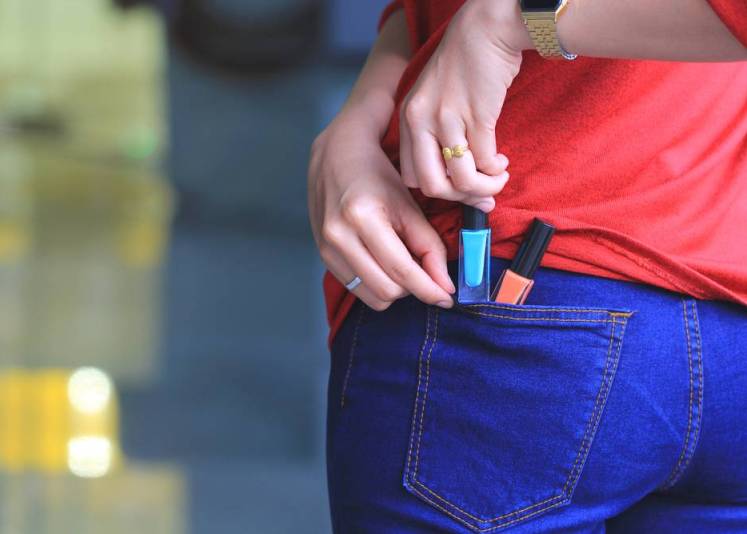Kleptomania is an Impulse-control disorder (ICD) whose main characteristic is an intense impulse to steal unnecessary objects, almost always of little value. It is a rare mental illness, which is often accompanied by other emotional imbalances.
The kleptomaniac does not plan their robberies nor seeks to benefit from them. This imperious need to take control of what is foreign arises from the intense emotion caused by the act itself. However, later, they may experience a sense of shame or guilt.
Although there is currently no cure for kleptomania, medication treatment and psychological therapy can help reduce the cycle of compulsive theft. Unfortunately, many refuse to seek support, because they do not accept their problem or fear being judged.
Kleptomania characteristics
It is very important to address the characteristics of kleptomania in detail, since it has several differences with respect to the behavior of a thief. First of all, the kleptomaniac does not steal for personal gain, but feels an impulse so strong that he cannot resist.
On the other hand, almost always acts spontaneously, that is, without planning or collaboration from another person. Most of the time, thefts occur in public places, such as stores or supermarkets; however, many come to steal in the homes of friends or acquaintances.
It is usual for the individual to hide stolen items and not use them; however, sometimes he prefers to donate them, give them away or even secretly return them to the place where they were stolen. The impulses come and go, and can occur with greater or lesser intensity with the passage of time.
Kleptomania Causes
The exact cause of kleptomania is unknown. One of the theories suggests that certain changes in brain activity may be responsible. It is also thought that the emotion of stealing helps reduce the depressive symptoms of the kleptomaniac.
Many cases are associated with addiction disorders, as the theft increases the release of dopamine, a neurotransmitter that produces pleasure. The individual, seeking again that rewarding sensation, repeats the robberies again and again.
Another possible trigger is the alterations in the opioid system of the brain, responsible for regulating the impulses. The problem is more frequent when there is a family history of kleptomania or if you have another mental illness such as bipolar disorder or anxiety.
Check Also: Is it possible to cure obsessive compulsive disorder without medication?
kleptomania Symptoms
In addition to the uncontrollable urge to steal, patients with kleptomania experience other psychological symptoms. Here we review the main ones:
- Strong impulse to steal unnecessary things
- Sensation of tension, anxiety or excitement before the robbery
- Pleasure or feeling of relief during the robbery
- Guilt, remorse or shame after the theft
- Fear of being arrested after the theft
- Reappearance of impulses and repetition of the kleptomania cycle.
Complications
When there is no timely diagnosis of kleptomania, lack of treatment can lead to emotional, family, work and legal problems. On the other hand, due to shame and guilt, self-esteem deteriorates and it is easy to fall into depression crisis. Other complications and disorders related to kleptomania are:
- Gambling or compulsive purchases
- Undue consumption of drugs and alcohol
- Eating disorders
- Depression and anxiety
- Bipolar disorder
- Suicidal thoughts or suicide attempts
Diagnosis
Giving a diagnosis of kleptomania is difficult, especially because people are ashamed to accept their condition. Often, cases are diagnosed when robberies reach legal instances. However, it is necessary to make a thorough physical and psychological analysis, as many thieves want to self-diagnose when they are in trouble.
To confirm this disorder, the professional in charge takes into account the criteria of the diagnostic and statistical manual of mental disorders (DSM-5) published by the American Psychiatric Association.
Treatment for kleptomania
Kleptomania is very difficult to overcome without a treatment. Therefore, although there are feelings of humiliation and fear in between, it is essential that the affected person requests professional help. Otherwise, the behavior will be prolonged, with a tendency to worsen.
Treatment to control this problem includes medications and psychotherapy. However, there is no standard treatment and it is not yet known precisely what may work best. In general, several types of treatments are recommended until you notice an improvement.
Medicines
Medications that are included in the treatment of kleptomania must be prescribed by a psychiatrist. Its use does not cure the disorder, but it does decrease related symptoms such as depression, substance abuse and impulsivity. The most common are:
- Selective serotonin reuptake inhibitors (antidepressants)
- Drug for addiction (naltrexone)
- Mood stabilizers such as lithium
- Anticonvulsants such as Topiramate or Valproic acid
Psychotherapy
A type of psychotherapy known as “cognitive behavioral therapy” allows the kleptomaniac to identify their negative behaviors and replace them with healthy ones. It also helps to achieve better control over behaviors to reduce theft.
It is common to have kleptomania relapses although used the two treatment options. Therefore, the general recommendation is to go to therapy, even when greater control over impulses is achieved. The continuous professional and family support is the key to face it.
